
THE VOICE OF INTERNATIONAL LITHUANIA
|
VilNews has its own Google archive! Type a word in the above search box to find any article.
You can also follow us on Facebook. We have two different pages. Click to open and join.
|
News
- Posted by - (0) Comment
· Japan
· China
· India
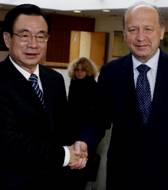
Lithuania is "China's important trading partner in the Baltic Sea region," He Guoqiang, member of the Standing Committee of the Political Bureau of the CPC Central Committee and secretary of the CPC's Central Commission for Discipline Inspection, said during this meeting with Lithuanian Prime Minister Andrius Kubilius.
The agreements that are negotiated, or are under development, are highly significant and may give Lithuania a key position as a link between Asia and EU.
The agreements represent all win-win situations for bilateral relations between the three countries and Lithuania, since both sides have much to gain from the sort of bilateral cooperation that have been negotiated.
For Lithuania, these agreements are so important, economically, politically and with regard to growth in research, technology and communications, that they are likely to be perceived as a political boost for the incumbent government. The deals are simply so promising that they can get PM Kubilius re-elected in the parliamentary election this fall.
Among the news in the cooperation between the countries are worth mentioning:
- JAPAN: Cooperation for the construction of a new nuclear power plant in Visagino, and related technology transfer.
- CHINA: New rail connection from China to Klaipeda and on to Antwerp in Belgium, plus a brand new IT innovation centre at the University of Vilnius.
- INDIA: Lithuania as India's textile industry's gateway to the EU.
Aage Myhre
aage.myhre@VilNews.com
A handful interesting inks with regards to Lithuanian bilateral cooperation with:
· JAPAN
· CHINA 1
· CHINA 2
· INDIA
- Bookmark :
- Digg
- del.icio.us
- Stumbleupon
- Redit it
- Posted by - (0) Comment
PM Kubilius welcomes Gazprom as investor in Lithuanian gas supply!

Lithuania, in unbundling the monopolies in the gas market, will let in Russian gas giant Gazprom to partly participate in the management of the country's gas-main (the large pipeline in which gas is carried for distribution through smaller pipes to consumers).
As Lithuanian Prime Minister Andrius Kubilius puts it, the company is a very important strategic partner and it is interested in gas transit to Kaliningrad region. Kubilius said that Gazprom would be just a financial investor, reports LETA/ELTA.
"Gazprom remains a very important strategic partner and it is absolutely natural that the company is concerned about the so called gas transit to Kaliningrad region. I personally do not see anything wrong in that. Gazprom would be just a financial investor without a final say as Lithuania would the one holding such right, there is nothing to worry about," the PM said to the radio Ziniu Radijas in a telephone interview from Stockholm.
The PM said that such provision of Gazprom being solely a financial investor and not having a casting vote in voting is outlined in Lithuania's letter which was handed in to Gazprom Export's Director General Alexander Medvedev during his visit to Vilnius Tuesday.
Kubilius reiterated that Lithuania must implement the EU Third Energy Package directive by the end of 2014.
During the meeting with Medvedev, Kubilius said that Gazprom could partly take part in the management of Lithuanian gas-main in the future.
- Bookmark :
- Digg
- del.icio.us
- Stumbleupon
- Redit it
Lithuania and Poland successfully discuss bilateral cooperation in EU matters
- Posted by - (0) Comment
![]()
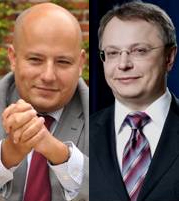
A successful partnership! Polish Secretary of State for European Affairs Mikołaj Dowgielewicz and Lithuanian Vice-Minister of Foreign Affairs Egidijus Meilunas.
WARSAW - On Feb. 2 in Warsaw, Lithuanian Vice-Minister of Foreign Affairs Egidijus Meilunas and Polish Secretary of State for European Affairs Mikołaj Dowgielewicz discussed bilateral cooperation in EU matters, Lithuania’s preparation for the Presidency of the Council of the EU in 2013.
The Lithuanian-Polish partnership in this area is assessed as very successful, especially consultations on the issues that are important for both countries, including the discussion on the EU Financial Framework 2014-2020.
- Bookmark :
- Digg
- del.icio.us
- Stumbleupon
- Redit it
- Posted by - (0) Comment
Kazimiera Prunskiene:
Russian direction is necessity, not a threat
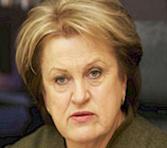
By Linas Jegelevicius. Baltic Times
Twenty years ago she was called the Baltics’ Amber Lady, who led Lithuania to its independence, but today the KGB collaboration shadow haunts Kazimiera Danute Prunskiene, even though she has successfully fought off this accusation in court. Out of the Lithuanian Parliament and ousted from the chairwomanship of the Lithuanian Peasant Popular Union, in 2009, instead of enjoying life out of politics, she established the pro-Russian Lithuanian Populace Party (LPP), which is said to be of increased interest to Lithuania’s State Security Department. Though the party was doomed to defeat in the municipality elections in 2011, it was among the parties to have gained the biggest financial contributions from electoral campaign donors. The first prime minister of independent Lithuania and, currently, chairwoman of the controversial Lithuanian Populace Party, sat down with The Baltic Times for this interview.
- Bookmark :
- Digg
- del.icio.us
- Stumbleupon
- Redit it
![]()
BY NIKOLAJ NIELSEN
BRUSSELS - The number of unemployed people in Europe is reaching record highs as the economic crisis unfolds into one with significant social consequences.
In eight member states alone, over 30 percent of young people under 25 are out of jobs. The worst affected continues to be Spain where half its young are jobless.

UNEMPOLYMENT IN LITHUANIA:
Youth unemployment: 31.1%
Overall unemployment: 15.3%
- Bookmark :
- Digg
- del.icio.us
- Stumbleupon
- Redit it
- Posted by - (0) Comment

Lithuania: not as bright as it seems
January 30, 2012
by Jonathan Wheatley

The mood turned sour again on European markets on Monday, as fresh worries about Greece rattled investors’ nerves. But that didn’t stop Lithuania getting a one-year bond auction away at a pretty impressive yield, on the day the country said its economy grew by a healthy 4.3 per cent last year.
Nevertheless, a glance behind the headline figures suggests that even where things look cheerful, investors should be cautious.
Lithuania sold 70m litas ($26.6m) of one-year debt with a yield of 2.74 per cent, Reuters reported, down from a yield of 3.876 per cent on 50m litas of debt maturing in August 2013 sold at the beginning of January. Average yields on Lithuanian one-year debt have fallen from more than 4 per cent at the end of November to 2.71 per cent today.
Lithuania and the other Baltic states, says Neil Shearing at Capital Economics, “have been the poster child for austerity in the face of crisis, pursuing internal devaluation and implementing big budget cuts despite huge falls in output.”
- Bookmark :
- Digg
- del.icio.us
- Stumbleupon
- Redit it
- Posted by - (0) Comment
Audronius Azubalis:
Sooner or later the history knocks at the door of the present

Foreign Minister Edward Nalbandian of Armenia and Lithuanian Foreign Minister Audronius Azubalis. Vilnius, 26 January2012.
Photo: urm.lt
Armenian Foreign Minister Edward Nalbandian paid a working visit to Lithuania on January 26. Within the framework of eth visit Minister Nalbandian had meetings with Lithuania’a Prime Minister Andrius Kubilis, Foreign Minister Audronius Azubalis and Vice-Speaker of Sejm Cheslovas Yurshenas.
At a joint press conference with his Lithuanian counterpart Edward Nalbandian expressed gratitude to Lithuania for adoption of the Armenian Genocide act back in 2005.
“The arguments of Turkey do not stand any criticism. They say the bill passed by the French Senate will hinder the process of normalization of the Armenian-Turkish relations. However, it’s clear to everyone that it’s only Turkey that prevents that normalization. Turkey says the French law edits history. Unfortunately, the black pages of the tragic history of our nation have already been written, and the only way to turn these pages is the recognition and condemnation of this crime against humanity.
The bill passed by the French Senate is not targeted against any concrete country, the Armenian Foreign Minister said, adding that Turkey’s reaction is an evidence of that country’s state policy of denial.
Referring to the same issue, the Lithuanian Foreign Minister said: “Sooner or later the history knocks at the door of the present, and we have to open it. We have to look the history in the face and assess the reality in an open, transparent and fair way. Without that we’ll never have peace in stable inter-state relations. That is why I think that right are the politicians who say that history must be discussed, while those who say history should be left to historians are wrong. Mistrust in bilateral relations will exist until we square accounts with the past.”
- Bookmark :
- Digg
- del.icio.us
- Stumbleupon
- Redit it
Lithuania recognizes ‘fact of Turkish mass killings’ in Armenia during WWI
- Posted by - (0) Comment
![]()

Genocide Survivor, Arax, Armavir Region, Republic of Armenia
Photo: http://globalvoicesonline.org
Diplomatic relations between France and Turkey are tending towards zero. That’s how Ankara has reacted to the French Senate’s approval of a bill that outlaws any public denial that the killings of Armenians which took place in the Ottoman Empire in 1915 were genocide. Turkey threatened to retaliate by introducing anti-French sanctions. The first blow came from the Turkish National Radio and Television Corporation which suspended cooperation with Euronews TV.
Earlier, Turkey recalled its ambassador from Paris, froze its political, military and economic ties with France and cancelled joint military exercises.
The bill imposes a punishment of up to one year in prison and a 45,000-euro fine on anyone who dares deny the Armenian genocide. President Nicolas Sarkozy has two weeks to sign it into law.
Turkey has vigorously protested the accusations of mass killings of Armenians during the First World War and reacted painfully to Western criticism. Meanwhile, the fact of genocide has been recognized by more than 20 countries, including Russia, Lithuania, Greece, Belgium, Canada and the majority of U.S. states. But that recognition envisaged no criminal penalties. Political analyst Stanislav Tarasov told the Voice of Russia that the fate of the genocide bill in France is still pretty vague and that 86 senators who voted against may attempt to block it:
"The Turks may try to play the French senator card. Senators can appeal the bill in the Constitutional Court. This would require just 60% of the votes. Turkey also fears that other countries may follow suit and pass similar genocide laws, which would derail its long-cherished hopes to join the European Union. Finally, Turkey and Armenia might return to the Zurich protocols they signed in 2009. They contain a very important provision, namely that Yerevan agrees to move the genocide issue from big politics to the academic sphere."
Some politicians in Ankara and in European capitals think that the past should be left in the past and that modern politics should be based on modern realities. And yet, genocide is too sensitive an issue for Armenia to be easily dropped. The Armenian government has already thanked Paris for support. The votes of 600,000 French Armenians whose representatives lobbied the new law will give President Sarkozy a significant boost in his bid for re-election.
- Bookmark :
- Digg
- del.icio.us
- Stumbleupon
- Redit it
![]()

The Republic of Lithuania Port of Klaipeda and the Philadelphia Regional Port Authority (PRPA) signed an historic Memorandum of Understanding that promises to open Philadelphia ports to the European and Asian shipping trade via the ice-free port of Klaipeda, the Lithuanian port city on the eastern coast of the Baltic Sea.
Lithuania’s Transport and Communications Minister Eligijus Masiulis led a delegation of that country’s leaders to meet with Pennsylvania state and city officials, as well as Leo A. Holt, President of Holt Logistics Corp., and PRPA Chairman Charles Kopp and Executive Director James McDermott. Together, they signed the MOU, which pledges increased support for expanded trade between Philadelphia and Klaipeda. The delegation also included Lithuanian Ambassador to the United States Zygimantas Pavilionis and Eugenijus Gentvilas, the Director General of Klaipeda Seaport.
- Bookmark :
- Digg
- del.icio.us
- Stumbleupon
- Redit it
![]()

* Floating LNG platform to have 170,000 cubic meters capacity
* Operations expected to start at the end of 2014
* Terminal to reduce Lithuania's dependence on Russian gas
Lithuania took a step towards less dependence on Russian gas by deciding on Monday to pick Norway's Hoegh LNG to provide an offshore platform for liquefied natural gas (LNG) imports.
Majority state-owned oil terminal Klaipedos Nafta said in a statement that it chose Hoegh to supply a floating storage regasification unit (FSRU), and that operations were expected to start at the end of 2014.
An FSRU is cheaper and faster to build than a fixed LNG terminal on land.
Klaipedos Nafta said that the FSRU had been ordered in South Korea and will have a capacity of 170,000 cubic meters of LNG.
- Bookmark :
- Digg
- del.icio.us
- Stumbleupon
- Redit it
Russian suspicion, wary that the U.S. is looking to create a Russian version of the Arab Spring
- Posted by - (0) Comment
![]()
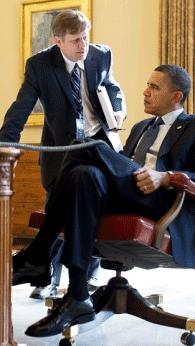
Mike McFaul, the new U.S. ambassador to Russia, with President Obama.
Just before Secretary of State Hillary Clinton swore in Mike McFaul on January 11 as the new U.S. ambassador to Russia, she told the audience packing the State Department's Benjamin Franklin Room that "Mike's reputation precedes him."
Yet it's that very reputation that has Russia eyeing McFaul with suspicion, wary that the ambassador, who arrived last Saturday, is looking to create a Russian version of the Arab Spring.
From the start, McFaul's mission to Moscow has been different. As Clinton explained to the audience that day, rather than send the Russian Foreign Ministry a diplomatic note announcing the appointment, the president took it upon himself to tell Russia's president, in person, about it.
"When President Obama saw President Medvedev at the G-8 summit in Deauville in May he simply said, 'I'm planning to nominate Mike to be the next ambassador to Russia,'" Clinton explained, "and President Medvedev responded immediately with a tone full of respect, 'Of course. He's a tough negotiator.' And that was that."
But it isn't his negotiation skill that has Russia nervous.
On McFaul's second day on the job in Moscow he was slammed by Russia's government-controlled Channel 1 television. "The fact is that McFaul is not an expert on Russia," said a Russian commentator. "He is a specialist solely in the promotion of democracy."
- Bookmark :
- Digg
- del.icio.us
- Stumbleupon
- Redit it
![]()
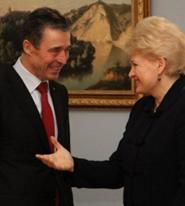
NATO chief Anders Fogh Rasmussen with President Dalia Grybauskaite
On a visit to Vilnius last week NATO chief Anders Fogh Rasmussen urged Russia to refrain from building up its military near the alliance’s borders, saying it was a concern for the 28-nation organisation. Rasmussen questioned Russian moves to bolster its forces in its Kaliningrad territory, which borders Nato members Lithuania and Poland, part of Moscow’s Cold War-era stamping ground. “These Russian statements are of course a matter of concern for Nato allies,” he told reporters in Lithuania’s capital Vilnius. “It is a complete waste of Russian financial resources, because it is a build-up of offensive military capacities directed against an artificial enemy, an enemy that doesn’t exist,” he said.
“Nato has no intention whatsoever to attack Russia,” he added, speaking alongside Lithuania’s President Dalia Grybauskaite. Moscow has warned that it plans to deploy Iskander missiles in Kaliningrad, and earlier this month, Russian media reported that an S-400 Triumph anti-aircraft missile system would go into service there in April.
- Bookmark :
- Digg
- del.icio.us
- Stumbleupon
- Redit it
Pentagon steers more money to Eastern European allies relying more on them as West cuts budgets
- Posted by - (3) Comment
![]()
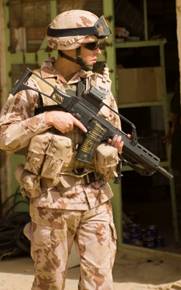
A Lithuanian soldier provides security for American Civil Affairs Soldiers during a market assessment in Dujayli, Iraq, July 9, 2008.
Photographer: Sgt. Daniel West,
Multi-National Division-Central.
The Pentagon is steering more money toward Eastern European allies fighting in Afghanistan even as it prepares further reductions of U.S. forces in nations to the west such as Germany.
The U.S. plans to spend as much as $100 million, 33 percent more than last year, to provide training and equipment to countries helping conduct special operations missions and training for Afghan forces fighting the Taliban, according to Pentagon figures released today.
The biggest increases are going to Hungary, Poland, Romania and Lithuania, which have made outsize contributions of troops to the North Atlantic Treaty Organization-led coalition in Afghanistan.
The Pentagon is relying more on Eastern European allies, most of them in NATO, as traditional alliance members such as the U.K., the Netherlands and Germany cut their own defense budgets. Western European allies also are looking to reduce their forces in Afghanistan in proportion to the Pentagon’s withdrawal of about a third of its forces by September.
Defense Secretary Leon Panetta said last week that the U.S. will halve the number of conventional brigades in Europe as it cuts $490 billion over the next decade and turns more attention to Asia.
The planned cut to two brigades will remove 6,000 to 10,000 troops, most of them in Western Europe. The U.S. had almost 80,000 military personnel stationed in Europe as of December 2010, more than 54,000 of them in Germany, according to the Defense Department’s website.
The Pentagon plans to compensate for the reductions by rotating more troops into the region and conducting additional joint training and exercises.
- Bookmark :
- Digg
- del.icio.us
- Stumbleupon
- Redit it
Lithuania thanks Denmark for endorsing proposals to strengthen European arrest warrant
- Posted by - (0) Comment

Lithuanian Minister of Foreign Affairs Audronius Azubalis thanked Minister of Justice of Denmark who took over the EU Presidency Morten Bodskov for expressing support for Lithuania and proposals to strengthen the European arrest warrant, reported BC the MFA.
"The attention of the EU Presidency is very important to us and vital to the full and effective application of the European arrest warrant," is stated in the letter of Azubalis to Bodskov sent on 13 January.
Denmark has announced its support to the initiatives of Lithuania and to the declaration signed together with Austria, in which the country undertakes to make practical steps to limit or withdraw the statements made under Article 32 of the Framework Decision on the European arrest warrant. It is possible that the statement has become one of the reasons why last summer Austria did not extradite to Lithuania the detained suspect in the January 13th case Michail Golovatov. "It is absolutely unacceptable that criminals, suspected for the crimes against humanity and placed under the European arrest warrant, might freely travel in the Schengen area," Azubalis stressed.
He also drew attention to the positive attitude expressed by a large majority of the Member States towards the European Commission's proposal to withdraw the declarations made under Article 32 of the Framework Decision on European arrest warrant, which do not allow to implement fully the European arrest warrant procedures.
"I trust that we will not lose this successful momentum and will be able to push forward the above mentioned question during the Danish Presidency. I am sure that the strengthening of the European arrest warrant, along with the other instruments of extradition and mutual legal assistance, are crucial measures to ensure our common security," Azubalis wrote.
- Bookmark :
- Digg
- del.icio.us
- Stumbleupon
- Redit it
- Posted by - (0) Comment
Is the so-called Baltic recovery based solely on EU subsidies?
Analysis: Estonian economic miracle is based on EU aid
EU aid received by Estonia plays a much bigger part than what is admitted by PM Andrus Ansip whose favourite line is that Estonian public finances are the best in the EU, writes Eesti Ekspress weekly.
What the PM is not saying in public is that EU aid is Estonia’s lifeline and the country could probably not survive financially without structural funds. From 2004 until 2010, Estonia received over 3 billion euros from the EU. During the period, it itself contributed only 924 million euros to the EU budget in various payments. This means that for every euro that Estonia spent it got back two. This so-called net profit was 497 euros per every citizen of Estonia in 2010 figures.
Estonia is second in the list of EU’s biggest aid recipients, trailing only Luxembourg. Third is Lithuania, followed by Greece, Latvia and Hungary. The three largest net donors to EU are Holland, Sweden and Denmark.
The aid helped Estonia survive the economic crisis that started in 2008 since at that time EU outlays to Estonia skyrocketed from 200 million euros to about 700 million today. Without huge EU aid funds received in 2008 and 2009, Estonia would probably have had to make even bigger spending cuts, borrow from IMF and kiss goodbye to euro. „At that time Estonian tax receipts fell so dramatically that, figuratively speaking, without injections from Brussels our financial system would have been in coma,” says Hannes Rumm, head of the European Commission in Estonia.
He adds that by current plans, Estonia should receive between 4.5 billion and 5 billion euros from the EU budget between 2014 and 2020.
Some critics are already warning that Estonia needs a better plan for the future since the ongoing economic crisis is going to force large net donors to cut budgets. Whether prime minister Andrus Ansip chooses to believe it remains to be seen.
- Bookmark :
- Digg
- del.icio.us
- Stumbleupon
- Redit it

This week President Dalia Grybauskaite criticized the government spending too much on Lithuania's presidency of the Council of the European Union. She said the budget could be reduced as we are in such a difficult economic situation.
On Wednesday, after meeting with Prime Minister Andrius Kubilius, the president said she has noticed how expenditures could be reduced.
Grybauskaite said that Denmark which is spending LTL 120 million ( EUR 34.7 million) on the presidency is an example that Lithuania should follow, writes LETA/ELTA.
"Denmark is to be a president of EU for LTL 120 million (EUR 34.7 million), while Lithuania is going to spend LTL 200 million (EUR 56 million)," said Grybauskaite.
- Bookmark :
- Digg
- del.icio.us
- Stumbleupon
- Redit it
VilNews e-magazine is published in Vilnius, Lithuania. Editor-in-Chief: Mr. Aage Myhre. Inquires to the editors: editor@VilNews.com.
Code of Ethics: See Section 2 – about VilNews. VilNews is not responsible for content on external links/web pages.
HOW TO ADVERTISE IN VILNEWS.
All content is copyrighted © 2011. UAB ‘VilNews’.

 Click on the buttons to open and read each of VilNews' 18 sub-sections
Click on the buttons to open and read each of VilNews' 18 sub-sections 

















.jpg)



